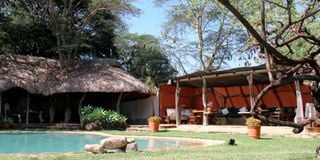Premium
A post-lockdown safari to Lewa

By the pool at the Elewana Lewa Safari Camp.
On one of our days there, we had a bush breakfast on a high point. For the full 360 degrees the scenery was vast and so magnificent
A glass of white wine, olives green and black and a cheetah sitting beside us in the yellowing grass… We were on an evening game drive in the Lewa Wildlife Conservancy. Joel, our driver and guide, had spotted the cheetah. We waited for him for about an hour before he got the urge to hunt. Now, he was staring with intent at a mixed herd of oryx and Grant’s gazelles grazing on a distant ridge.
The oryx are too big for a cheetah to tackle, but the gazelles are his kind of prey. Eventually, and as the light was fading, the gazelles detached themselves from the oryx and moved slowly down the slope, in our direction but at an angle. The cheetah stood. He stretched his lithe body. Head low and eyes concentrated, he started the hunt.
What happened down in the valley, we will never know. It was too dark for us to see. That was no matter. We had sat a good while beside one of the most beautiful and lethal of Kenya’s wildlife. Our cheetah perhaps would not outlast the runners in the annual Lewa Marathon, but it could certainly outsprint the best of them.
The Lewa Wildlife Conservancy is one of Kenya’s most important conservation areas, as is signified by its status as a UNESCO World Heritage Site, along with the Mount Kenya National Park to which it is linked by an ingenious elephant corridor, with its ‘subway’ under the road to Isiolo. It has a variety of ecosystems – grasslands, forests and wetlands. On one of our days there, we had a bush breakfast on a high point. For the full 360 degrees the scenery was vast and magnificent.
Young jackals
Twice on each of our three days there, Joel took us to different places. We saw herds of elephants and endangered Grevy’s zebras. We lost count of the number of rhinos we saw – mainly white but also some black. We watched a young lioness climb a tree.
And our vehicle attracted the curious attention of four young jackals, watched over by their mother.
We were staying at the Elewana Lewa Safari Camp, which enjoyed a marketing coup when it became known as the place where the British Prince William proposed to his Kate. But it has a deserved reputation for the restrained luxury of its accommodation, the attention of its service and the quality of its food. With only 15 tents, the management can afford to be flexible in the timing of meals and activities – in a manner that would be impossible in larger properties.
The breakfasts and lunches are served by the laptop pool. I would have gladly spent more of our time there. Attracted by offerings of birdseed, and the chance of a drink and a shower at the pool’s edges, the birdlife is astounding.
Little sparrows
There were big ravens and little sparrows, grey doves and yellow weavers, superb starlings and robin chats. Best of all, we spotted an emerald green Klaas’s cuckoo in a nearby bush. If the cheetah is one of Kenya’s most beautiful animals, the Klaas’s cuckoo must be one of it most beautiful birds.
I had a long chat with the Manager, Charl Grobler. He had some very significant things to say about the effect of Covid. ‘The tourist industry has been taught an important lesson,’ he said. ‘Before Covid we didn’t pay enough attention to the potentials of local tourism. But because of Covid, we had to do that. It has been our lifeblood. And look at this weekend – we are fully booked. People are so relieved to be able to drive out after the lock-downs.’
And that was how we felt as we took to the road out of Nairobi last week.
If you want to know more about the conservancy, go to www.lewa.org; for the Lewa Safari Camp, go to www.elewanacollection.com.
John Fox is Chairman of iDC . [email protected]





